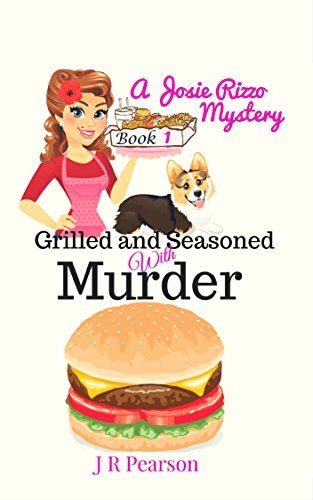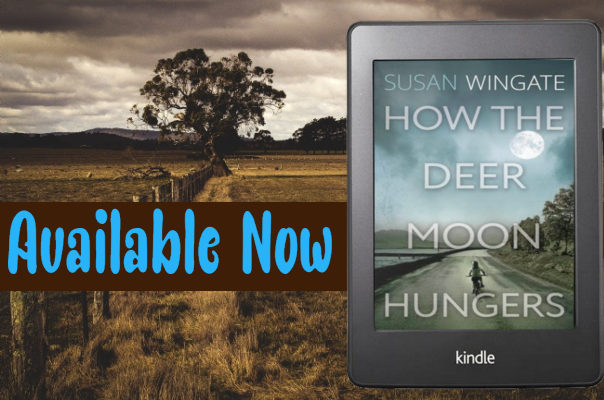Susan Wingate
YA/Coming of Age/Mainstream Fiction
For those who enjoy reading books like Where the Crawdads Sing and My Sister’s Keeper
MACKENZIE FRASER witnesses a drunk driver mow down her seven-year-old sister and her mother blames her. Then she ends up in juvie on a trumped-up drug charge. Now she’s in the fight of her life…on the inside! And she’s losing.
HOW THE DEER MOON HUNGERS is a coming of age story about loss, grief, and the power of love.
ORDER YOUR COPY
Amazon → https://www.amazon.com/dp/B08676VMT3
PART ONE
the beginning“a flower knows, when its butterfly will return, and if the moon walks out, the sky will
understand; but now it hurts, to watch you
leave so soon, when I don't know, if you will ever come back.” ―Sanober Khan
1
The Day Before
I, one Miss MacKenzie Becca Fraser, was never one for saying fuck much. But as with life, things change.The year before, Dad removed Tessa’s training wheels. The bike had grown up, was halfway between a tricycle and a teenager’s bike. Her eyes glowed when the trainers came off. Her smile? Buoyant. My bike was what Tessa called a big girl bike—a beach cruiser in Tiffany box blue. Mine didn’t have ribbons shooting out of the handles. Can you imagine me going to school with ribbons out of the handles? My peeps would never let me live it down.
The evening before what people called the worst thing that’s happened on the island since Becca Winthrop went and flopped over dead of heart failure at the liquor store, we set off on a night ride—Tessa and me. We left Mom at home stirring up dust with her favorite electric broom. Tuesday was a lazy fall night, one with the sun and moon in competition for the evening sky; with the sun being selfish for time, trying to hang on to day even though it knew it should just stop shining, give up, and go away. We’d stuck playing cards in the spokes of our tires to add to clicking crickets, tree frogs chirping, a not-so-distant fox hacking out a cough to alert its scattered pack of food found—a doomed rabbit or kitty kibbles left out on someone’s porch. Up the hill, deep in the woods, an owl’s Psalm echoed back from its mate as if they were holding invisible hands across the horizon, not wanting to let go. Their song played while we rode.
We’d split the deck of cards, each one clipping twenty-six onto our tire spokes to deter animals from darting out into the lane ahead. Because that was all we needed—to crash into a raccoon crossing the street. Not much good for the coon either. But the road was deserted, and I kept Tessa in front, keeping my eye out for her.
Tessa rode her bike fast like she was angling to lasso the moon, which sat high at the end of the road over Old Man Johnson’s cattle farm. The big, yellow ball lolled around atop a silhouette of gossamer evergreens framing a large swatch of grazing land.
Wind fluttered that silky sable ponytail of hers as we came off the downhill side of False Bay Drive where the road at the end of summer stripes a path of thirsty grass along the strait, where cows graze in a pasture trimmed by a stand of golden poplars, crooked and bending toward the north sky away from steady winds coming off the water. Most people think that on our island in the Pacific Northwest, we live in slickers and galoshes year-round. But that’s the secret we have. Seattle gives our island a bad reputation, makes us soggy when we’re not. We live in what meteorologists call a banana belt or a rain shadow, so our island lacks the lush, drippy rainforests often found in other parts of the Pacific Northwest.
Each downstroke of my pedals matched rhythm with the plastic ribbons whipping off Tessa’s handlebars, whizzing like a thousand bees around her hands. When she skidded to a halt in front of me, I yanked left, my wheels slipping as I swerved to miss her, no doubt balding a spot on the tire’s rubber.
“What’s wrong with you?” I demanded, anger flashing hot in my cheeks and pooling into my chest.
Tessa didn’t seem to hear me. She was gaping up at the sky with that moon gaping back at her.
“What?” I repeated, but this time we were both fixed on the dang moon.
“Do you see it, Mac? The deer?” Tess was in the habit of starting, finishing, and rereading Thurber’s The White Deer for, like, the millionth time—a read way above her grade. In fact, she often fell asleep with the stupid book open-faced on her chest. Then the next morning she’d stick a crow feather in the book to mark her place and set it on her nightstand, ready for her evening read.
“There’s no deer in the moon, dork, but there might be a man if you look hard enough. You need to read real stuff. You’re getting weird.”
“See its horns?”
“Antlers.” I told her. “A hungry moon like that likes to eat seven-year-olds for dinner.” “Nuh-uh,” Tessa answered.
I rolled my bike backward, parallel to hers, close enough to sneak my hand around the back of her head and yank her ponytail.
“Don’t,” Tessa yelped.
I enjoyed hearing her whiny kid voice. Mom called it plaintive. But Mom liked to make things sound more sophisticated. Her beaten-up chest of drawers was a chiffonier. The mossy stone patio, a pergola. Mom wanted more out of life, and I suspected she harbored a few regrets. “Our island didn’t hold a candle to New York City,” she’d complained one night. “Not even to Seattle. At least Seattle has an international flair,” she’d said.
Mom could have been a model if she’d pursued it, but she’d fallen in love, had kids. The what-happenedto-my-life syndrome seemed to have snagged her in a net she couldn’t get out of. She often talked about things she would do after Tess and I were out of school, when the house and her life were her own again. A longing filling her words, just enough for me to sense an underpinning of resentment. Her gaze would shift to the window, outside, away and away, but not for long; and she would chuckle. Then, she’d sit upright and say, “Oh, we wish on stars and mushroom caps for moon dust and fairies.” I don’t know where she got that phrase, but Mom always trotted it out when she got wistful. Maybe it came from Gramma Kiki. Who knows? It really doesn’t matter, but the oddity of a phrase like that will stick with you.
And although our island boasted an international school—Spring Street School—our town was mostly country, with nothing international about it. We didn’t even have a stoplight. Just stop signs and, of late, one abused turnabout.
When I glanced sideways at Tessa, she was straddling her bike as she stared up at the moon. I noted a certain otherness in her expression, as if we weren’t alone, as if the ghost of that deer she’d spotted in the moon had plopped onto her shoulders and was weighing her down. Her eyes seemed dark with worry and as deep as a pair of bottomless wells, shimmering with unshed tears. I think about that worry sometimes. It haunts me still.
“Come on,” I said. “We’d better get home. Mom’s already in a snit.”
“I wonder what the deer eats, Mac. Do you think it’s hungry?”
“One thing it doesn’t eat, Tess, is cheese!” I said, laughing, but Tessa didn’t get it. She didn’t know then, or ever, about the man in the moon or about the cheese the moon was allegedly made of.
I used to like the word allegedly. I’d learned it as a vocabulary word at the start of my junior year, and I got it right on a pop quiz in homeroom spelling. The teacher even had me write my sentence on the board: Gemma allegedly hid the pencil from me, but there was no evidence to prove that for sure. The sentences I would write with this word now could not be more different: I was allegedly taking care of Tessa when we went to the park the day after looking at the deer moon. And I was allegedly not watching when the car hit her. Allegedly became an important word for me after Tessa died. It’s weird to recall how much I liked the word in my junior year but hated it afterward when I heard the cop use it.
“Allegedly,” he’d said, “the younger one was in the older sister’s care.” And then, as though no one understood, “The older one was supposed to be watching the younger one.” He said one as if we were buttons on a conveyor belt at some stupid button factory. The jerk.
After Tess died, I started counting the days of the moon as it sketched out a path in the sky from crescent to half to gibbous to crescent again. I called it moon spying, and every month when the moon was ripe, I used to rush outside to search that big ol’ cheese wheel. Maybe I’d spy Tessa riding on the back of the deer ghost, but mostly I just hoped she might see me searching the moon for a glimpse of her.
WEBSITE & SOCIAL LINKS:
Website: www.susanwingate.comBlog: www.susanwingate.com/blog
Twitter: http://www.twitter.com/susanwingate
Facebook: www.facebook.com/authorsusanwingate































